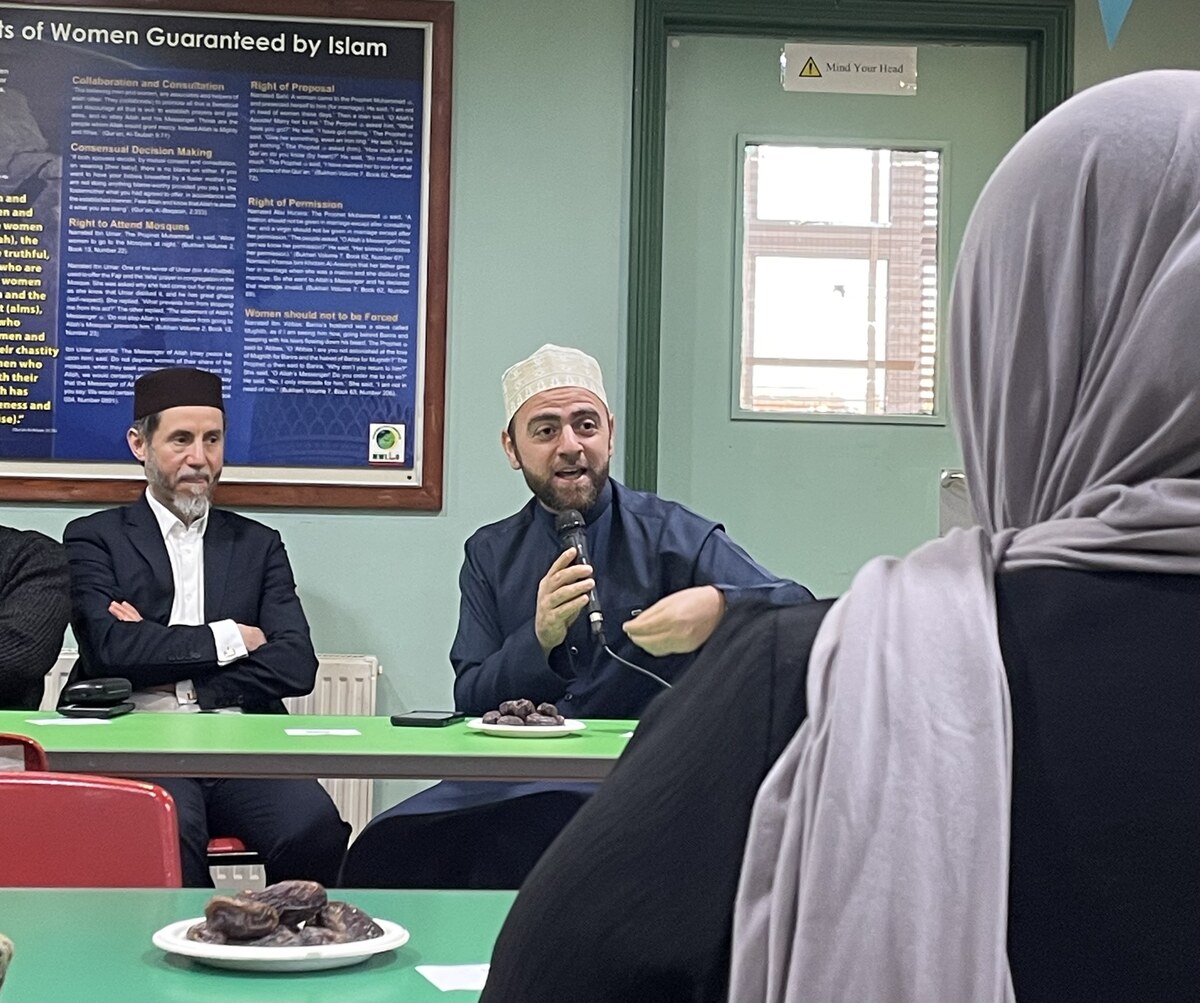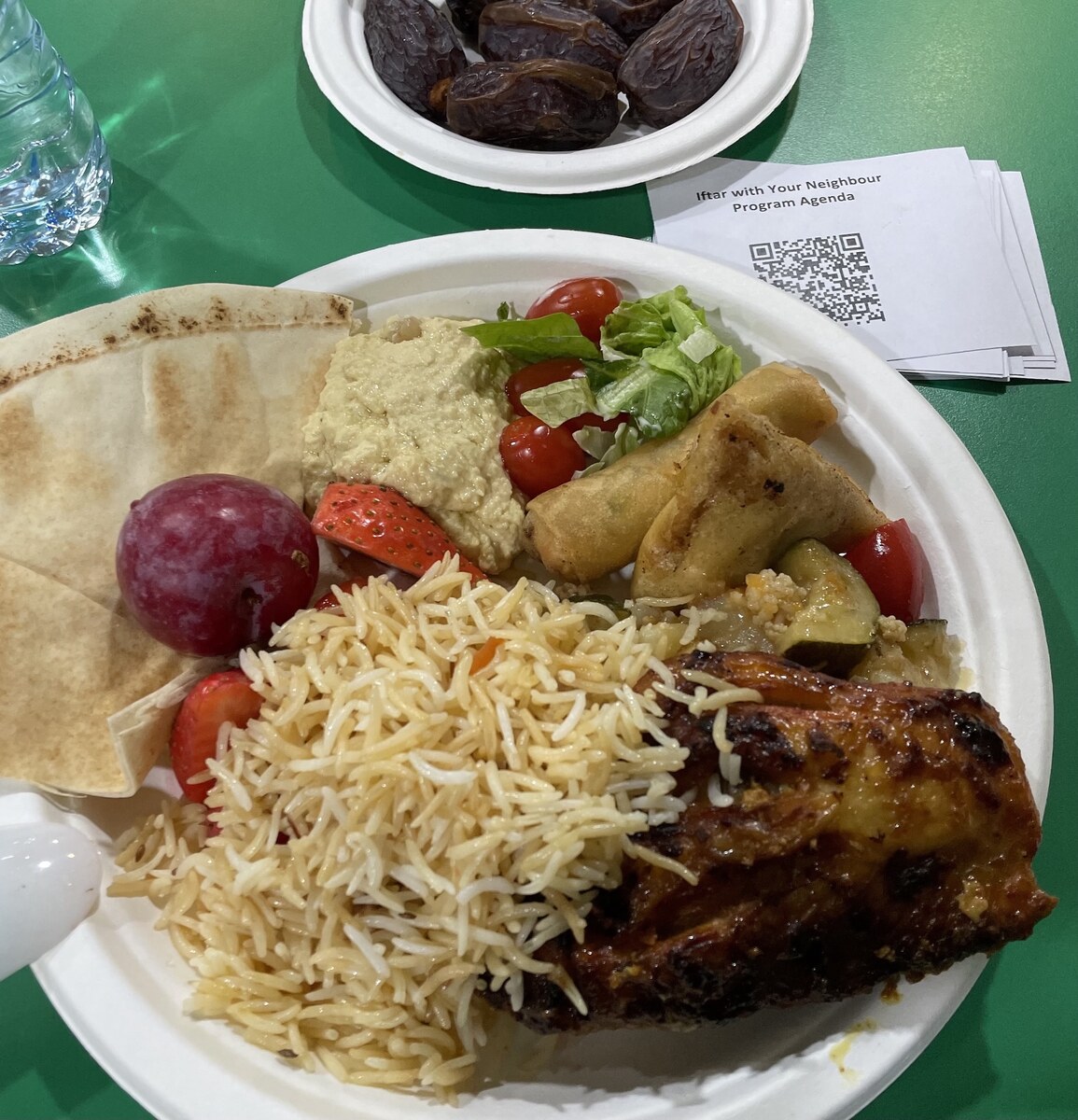LONDON: Tucked in the corner of Goodge Street and Charlotte Street in London, the Muslim World League has been providing sanctuary for communities and bridging gaps between faiths for over four decades.
The league operates out of a five-story building with a mosque, offices, and community space. It hosts iftars during Ramadan and provides hot meals for nearly 230 people daily.
Historically the shopping quarter of London, both before and after its destruction by the Nazi blitz in World War II, Goodge Street remains bustling with cafes, boutiques, and restaurants.
This week, workers from the area gathered at the MWL’s mosque to pray the Maghreb, marking the fasting day’s end. You could tell who was working where from the company brand on their clothes or those who worked in the kitchens, as the smell of dishwashing soap is hard to miss.
The league hosted an “Iftar with Your Neighbour” event on Tuesday evening focusing on asylum-seekers in the Borough of Camden, which has been designated as the “Borough of Sanctuary” due to its work with Ukrainian and Afghan refugees since 2021. Other themed iftars hosted by the MWL in Ramadan include events for interfaith dialogue and welcoming new worshippers.
We want to show the best of Muslims in the UK and how we contribute to the global peace
Muath Alamri, director of MWL's London office
Mohammad Zarzour, an imam who leads Friday’s sermons at the league’s mosque, told Arab News that asylum-seekers feel a deep estrangement the moment they leave their countries. Zarzour is from Syria, a country whose population has endured a brutal civil war that displaced millions across Europe and Arab countries and has just emerged from decades of Assad dictatorship.
For him, such iftars are not just about providing food and drink to asylum-seekers. Their importance lies in showing empathy, affection, and a sense of community and family. Refugees face numerous difficulties, he said, some of which may sound trivial, such as describing their pain to the doctor or dealing with officials’ letters and applications.
“Learning a new language is not easy for someone with a family and children who find themselves in a foreign country they are not accustomed to. Balancing work, learning, and caring for their children can be quite challenging,” Zarzour said.

Mohammad Zarzour, an imam, said that asylum-seekers feel a deep estrangement the moment they leave their countries. (Arab News/Mustafa Abu Sneineh)
Camden has seen a significant increase in the number of asylum-seekers from Ukraine and Afghanistan following the Russian invasion of Ukraine in February 2022 and the fall of Kabul to the Taliban in August 2021.
The borough has a history of welcoming refugees, seeing waves of migration throughout the 20th century, as it is home to St Pancras International, a port of entry to London, and one of the UK’s busiest railway stations, which connects it to various European cities.
Camden allocates nearly £50 ($64.31) per asylum seeker weekly for housing and financial assistance from the Home Office budget of £2 billion for asylum support in 2024-25, reduced from £4.3 billion in 2023-24.
The spending required to accommodate the increasing number of refugees arriving by boat through the English Channel has become a contentious topic of debate in the UK. Last summer, the country experienced its worst riots in 13 years when far-right protesters attacked hotels housing asylum-seekers in various towns.
Some refugees, including Ukrainians and Afghans, fled from war-torn countries. In the case of the Afghans, many were airlifted from Kabul by the UK Ministry of Defence following the Taliban’s takeover of the city.
Food sharing is a great connector across different communities, backgrounds, faiths, and skin color
Guy Arnold, Camden Council
Guy Arnold, the strategic lead for refugee communities at Camden Council, said that in just one week in May 2022, over 400 Ukrainian refugees arrived at St Pancras International.
“Many refugees arriving were traumatized; they had young children, they hadn’t eaten properly, and they needed water. Above all else, they needed a place of safety and security to sit down and gather their thoughts about the next great steps they need to take,” he said.
Arnold added that Camden has successfully resettled 100 Afghan families in the borough, part of 1,800 refugees across London. Unlike their Ukrainian counterparts, who are granted temporary residency status, the Afghan families receive indefinite leave to remain, which equates to permanent residency in the country.
He commended such an iftar event for aiding the council with community work. “Food sharing is a great connector across different communities, backgrounds, faiths, and skin color,” he said.

Muslim World League hosts iftars during Ramadan and provides hot meals for nearly 230 people daily. (Arab News)
Samiullah, an Afghan who attended the iftar with his family, said he enjoyed meeting and connecting with other Muslim families. His English, however, was rusty, and his young son Hilal translated the questions. Hilal attended the Qur’anic lessons with Zubeda Welcome, a charity supporting refugee children in the UK to retain their Muslim identity.
It is the second year Yunis, from Kabul, has come to an iftar organized at MWL. He said he wanted his children to meet other kids and learn about Ramadan, as they do not have family members in Camden.
Muath Alamri, the director of the MWL's office in London, told Arab News that since its inception as a charity in 1982, the organization has supported vulnerable people in the UK while combating hate speech and engaging in social work.
In recent years, the league has collected donations to assist people in Gaza, Burma, and Pakistan, and it has partnered with Islamic Relief, Al-Khair Foundation, and various interfaith organizations.
“We want to show the best of Muslims in the UK and how we contribute to the global peace,” Alamri said of the league’s mission.



























